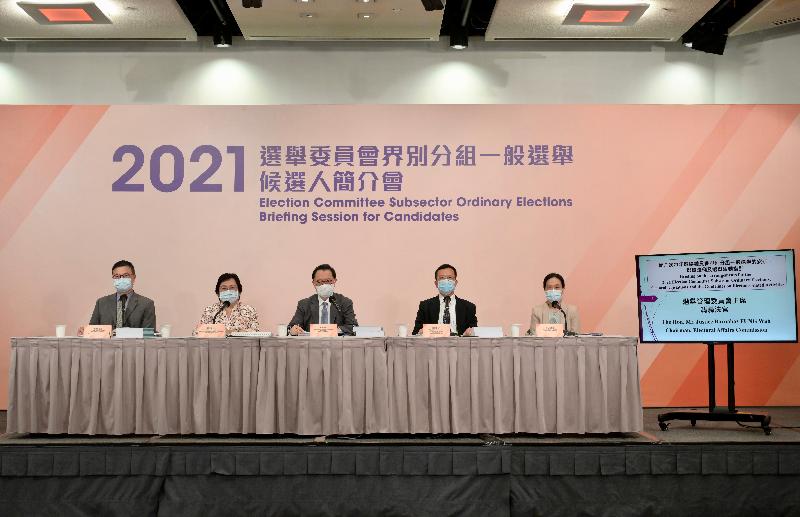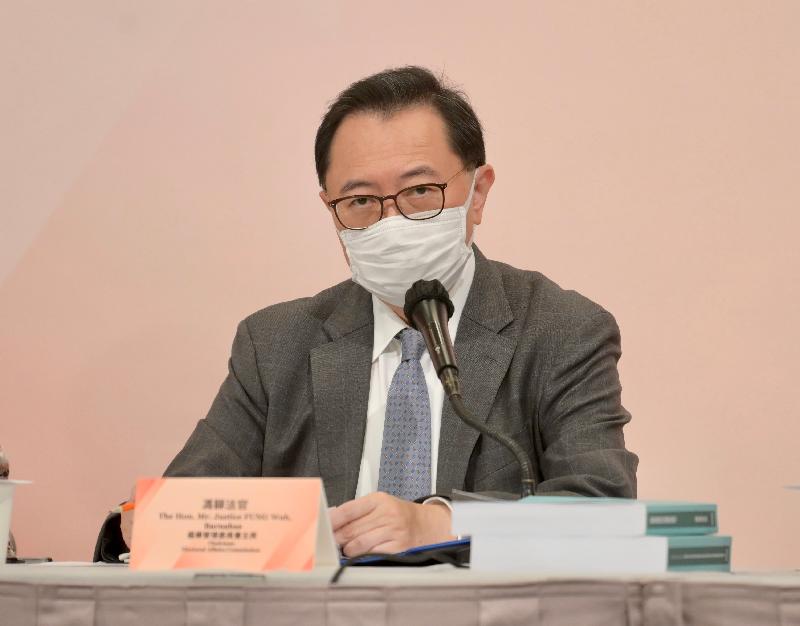Election Committee Subsector Ordinary Elections' candidates briefed on electoral guidelines and legislation (with photos/video)
******************************************************************************************
The Chairman of the Electoral Affairs Commission (EAC), Mr Justice Barnabas Fung Wah, conducted an online briefing for the candidates of the 2021 Election Committee Subsector (ECSS) Ordinary Elections tonight (August 26) on important points to note in running their election campaigns.
"The ECSS Ordinary Elections are the first public elections after the Improving Electoral System (Consolidated Amendments) Ordinance 2021 (the Ordinance) was enacted. When it comes to public elections, openness, fairness and honesty are the most basic principles. The EAC will strive to follow these principles and make practical arrangements in accordance with the law," Mr Justice Fung said at the briefing.
"The ECSS Ordinary Elections will be held on September 19. In terms of the seats which will be returned by election, a total of 1 016 nomination forms were received by Returning Officers during the nomination period that ended on August 12. The nominations of 1 015 candidates were determined as valid by the Candidate Eligibility Review Committee (CERC), and the remaining one nomination was determined as invalid.
"Of the 36 EC subsectors with seats to be returned by election, polls will not be held for 23 subsectors, as the number of validly nominated candidates in each of these subsectors does not exceed the number of EC members to be elected. Polls will be conducted for 13 subsectors, a total of 364 seats, in which there are contested elections. The Returning Officers have drawn lots on August 23 to determine the order in which the names of candidates appear on a ballot paper and the designated spots of election advertisements allocated to the candidates. The Candidate Numbers of the relevant candidates have been promulgated in the gazette notices today."
Mr Justice Fung briefed the candidates on the arrangements for polling and counting of votes in the elections.
Polling arrangements
For the 2021 ECSS Ordinary Elections, five ordinary polling stations and one dedicated polling station at a police station will be set up. The polling hours will be from 9am to 6pm. Voters can only cast their vote at the polling station allocated to him/her. List of the polling stations will be gazetted later. An Electronic Poll Register (EPR) will be used for the first time for issuing ballot papers at polling stations for more efficient and accurate issuance of ballot papers. A voter/authorised representative (AR) of corporate voters must show his/her Hong Kong identity card and temporarily pull his/her mask aside at the ballot paper issuing desk as instructed. The polling staff will scan the voter/AR's Hong Kong identity card with a tablet and issue ballot paper(s). The voter/AR may check his/her name, partial Hong Kong identity card number and type(s) of ballot papers issued to him/her as shown on the tablet on the ballot paper issuing desk during the issuance process. Voters/ARs were reminded to use the black pen provided by the polling station to fill in the oval next to the name of each chosen candidate on the ballot paper when voting. They should vote for no more than the prescribed number of seats in the relevant subsector, otherwise the ballot will be regarded as invalid. To ensure the secrecy of votes, no facial recognition device will be installed in the polling stations.
"Because of the considerable number of candidates, it is in principle alright for voters/ARs to bring along a piece of paper listing the names or numbers of the candidates of their choice for easy reference when marking the ballot papers. Nevertheless, voters/ARs should bear in mind that they should not show the paper to other people inside the polling station and they should take the paper with them when leaving the polling station. Otherwise, the voters concerned may violate the law.
"To ensure that voters/ARs understand the proper voting procedures clearly, the Registration and Electoral Office (REO) will send a guide to the voting procedure to voters along with the poll card at least five days before the polling day. In addition, we have produced a short video on the polling procedures and preventive measures for COVID-19 to be implemented in the polling stations. The video has been uploaded to the websites of the EAC (www.eac.hk), the REO (www.reo.gov.hk) and the election website (www.elections.gov.hk) for reference," he added.
The Ordinance has also amended the electoral legislation to improve the queuing arrangements for voters/ARs to collect ballot paper(s). In brief, two queues will be set up at the polling station. One is the special queue for persons who are aged 70 or above, persons who have difficulties in standing for a long time to queue due to their physical condition and pregnant women. Another one is for the other voters/ARs. The Presiding Officers will flexibly deploy ballot paper issuing desks with a view to reducing the overall waiting time. Mr Justice Fung emphasised that as stipulated in the Elections (Corrupt and Illegal Conduct) Ordinance, a person engages in corrupt conduct at an election if the person wilfully obstructs or prevents another person from voting at the election. If the polling staff find or suspect that a person obstructs other voters entering polling stations by repeated queuing or other means, they will inform law enforcement agencies to handle the situation.
Counting arrangements
Once the poll is closed, the ballot boxes of ordinary polling stations and dedicated polling stations will be delivered to the Central Counting Station at the Hong Kong Convention and Exhibition Centre where counting of votes will take place. Candidates, election agents and counting agents can enter the central counting station to observe the count at the designated area. An area will be reserved for members of the public to watch the counting at the media centre. The maximum capacity of the public area will be announced on the election website before the polling day.
All election results will be announced at the media centre of the central counting station and uploaded to the election website. For record purposes, recording facilities will be installed in the central counting station to record the actual situation, so as to ensure order in the venue.
Safety measures in response to COVID-19
The REO will implement a number of measures to prevent the spread of COVID-19 in the polling and counting stations, which include requiring all polling and counting staff to wear surgical masks or other protective equipment recommended by the Centre for Health Protection (CHP); not allowing staff with fever symptoms to perform election duties; placing transparent partitions at ballot paper issuing desks to separate the staff and voters; requiring candidates, their agents and voters to wear their own masks, use hand sanitiser and have their body temperature checked before entering polling and counting stations; and ensuring that voters maintain social distancing.
"Given that candidates or their agents will stay in the polling and counting stations for a relatively long period of time, if they have fever symptoms, they will not be permitted to enter polling and counting stations, and they may assign an agent without fever symptoms as a replacement. A voter with fever symptoms will be directed to a special voting compartment in the polling station to vote as it will only take a short time. The special voting compartment will be disinfected by staff after each use. Polling stations will be disinfected by staff with cleaning supplies when necessary. The REO will continue to monitor closely the development of the epidemic, seek advice from the Food and Health Bureau and the CHP, and make assessments based on the situations. I would also like to appeal to voters who intend to vote but are currently not in Hong Kong to take note of the quarantine measures for inbound travellers. They should plan their itinerary as early as possible and allow sufficient time for quarantine arrangements, so that they can exercise their voting right on the polling day," Mr Justice Fung said.
Displaying and dismantling election advertisements
When using election advertisements for publicity, candidates should pay attention to the provisions of the electoral laws concerned, including candidates should obtain prior written permission before displaying their election advertisements on government or private land and properties. The display of election advertisements at the designated spots assigned by the Returning Officers must comply with relevant regulations and conditions. For example, candidates shall not hang vertical banners on street railings and fences in light of road safety concerns. As stated in the Guidelines on Election-related Activities, candidates must remove all of their election advertisements displayed on government land or properties within 10 days following the election. Otherwise, relevant authorities will remove and issue demand notes to the candidate concerned. The cost of removal will be construed as election expenses and the candidates must include all these election expenses in their election returns.
Election meetings
In accordance with the Elections (Corrupt and Illegal Conduct) Ordinance, an election meeting is a meeting held to promote or prejudice the election of a particular candidate or particular candidates. Expenses incurred before, during or after the ECSS Elections on account of an election meeting organised for any of the purposes stated above are election expenses. If the event or meeting is of a regular nature (such as regular meetings and festive celebrations), and there is no promotion of a particular candidate or particular candidates, the candidate may attend the event or meeting as usual if it is not for the purpose of promoting or prejudicing the election of a particular candidate or particular candidates.
However, candidates should act cautiously and avoid the possibility of unnecessary doubts. For example, if someone "canvasses for him/her" during the event or meeting, the candidate should immediately stop the canvassing and state that he/she is not involved, or even leave. Otherwise, it could be regarded as an election meeting and the candidate must estimate and declare the expenses by himself/herself.
Information on the candidates nominated and the elections is available on the election website (www.elections.gov.hk).
Ends/Thursday, August 26, 2021
Issued at HKT 20:25
Issued at HKT 20:25
NNNN
Photo
Audio / Video
Online briefing for candidates of 2021 Election Committee Subsector Ordinary Elections






